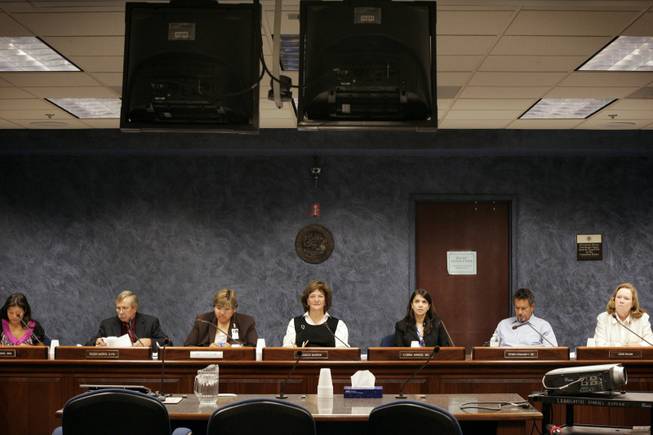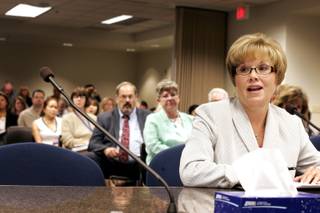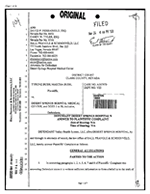
The State Board of Health meets at the Grant Sawyer building in Las Vegas Friday, August 13, 2010.
Saturday, Aug. 14, 2010 | 2 a.m.
Do No Harm: Hospital Care in Las Vegas, Part 2
- A hidden epidemic
- Hospital stay will stay with her always
- VA system stanching MRSA
- Hospital’s sanitation promises quickly forgotten
- Billing codes key to data analyzed on infections
- Where I Stand: Rise in infection rates, hospitals’ reticence are troublesome
- Editorial: Hospitals should do more to protect patients from deadly bacteria
- ‘We’re the ones who are in there. Our lives are entrusted to them.’
- Health board backs limits on disclosure of infections
- How best to stem spread of infection?
- St. Rose breaks ranks with disclosure on quality of care
Share your stories
The divide over whether the public should know the specific hospitals where patients are contracting lethal “superbugs” was clear at Friday’s meeting of the state Board of Health.
There were those who champion transparency — believing that revealing where the problems are will force officials to address them.
And there were those who oppose it.
The discussion centered on proposed regulations stemming from a law passed during the 2009 Legislature. The new law mandates that health care facilities report certain infections, including Methicillin-resistant Staphylococcus aureus, better known as MRSA, to the Centers for Disease Control and Prevention.
The Nevada State Health Division could then access the information to track infections. But under the proposed rules, those data would not be available to the public, at least in any way that would allow patients to identify the number of infections at any particular medical facility.
Those opposed to giving the public access to the infection data included hospital lobbyists, public health and infectious disease specialists and, in the end, apparently, the Board of Health, which took no stance in favor of public reporting.
On the side of transparency were an insurance lobbyist, a state lawmaker and the families of patients who have been infected with drug-resistant bacteria while hospitalized.
One family member questioned whether hospitals should be able to self-report in the first place.
“You’ve got Dracula in charge of the blood bank here because (hospitals) can choose what they want to report,” said Steve Winters of Reno, whose mother died after contracting multiple infections in Northern Nevada hospitals.
A Las Vegas Sun analysis of hospital billing records on file with the state found that hospital-acquired infections from MRSA and another drug-resistant bug, Clostridium difficile, or C. diff, are a growing problem in Las Vegas. In 2008 and 2009, there were 2,010 cases at local hospitals. Two hundred thirty-nine of the infected patients died, although it’s impossible to tell from the billing records how or whether the infections factored in the patients’ deaths.
State Sen. Shirley Breeden, D-Henderson, who sponsored last year’s legislation, Senate Bill 319, said the regulations are a good start but more transparency is needed so the public knows where the infections occur. Breeden’s father was infected with MRSA during a Las Vegas hospital stay, she said.
Theresa Brushfield told the board that her 48-year-old daughter was infected with MRSA at a Las Vegas hospital. Everyone who entered her room was supposed to wear a protective gown to prevent the spread of the bacteria, yet many nurses, food servers and custodial workers ignored the order, Brushfield said.
She told the board that hospitals should be required to post signs in the rooms of infected patients, directing people to call the Health Division, which licenses hospitals and investigates complaints. (People with complaints about health facilities can reach the Health Division at 486-6515 ext. 237).
The Nevada Hospital Association, the industry’s main lobbying group, which has argued for years against identifying facilities where patients contract such infections, testified in favor of the regulations that protect hospitals from having to disclose their data publicly. Bill Welch, president and CEO of the association, said he is in favor of “meaningful transparency,” a term he did not define.
A representative of the Association for Professionals in Infection Control and Epidemiology testified that the group also supports transparency and public reporting, yet still supported the regulations.
Dr. Randall Todd, a Washoe County epidemiologist, asked that public health officials be allowed to see which facilities are reporting infections. He said he supported the regulations.
The Board of Health did not debate the issue.
Board members — including doctors, a dentist and a veterinarian tasked with a mission of ensuring “good sanitation is practiced and there is a minimum risk of contracting disease or experiencing disabling unintentional injury” — made no substantive comments on transparency. Nor did they question hospitals about infection-control practices or engage the families of victims of hospital-acquired infections.
The board voted unanimously to adopt the regulations.




Join the Discussion:
Check this out for a full explanation of our conversion to the LiveFyre commenting system and instructions on how to sign up for an account.
Full comments policy